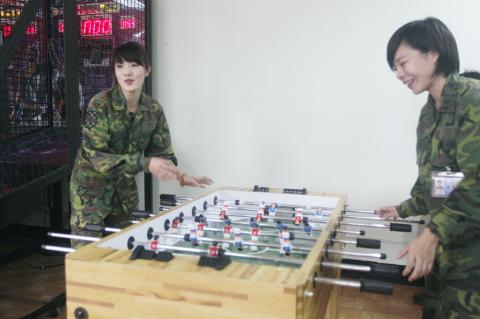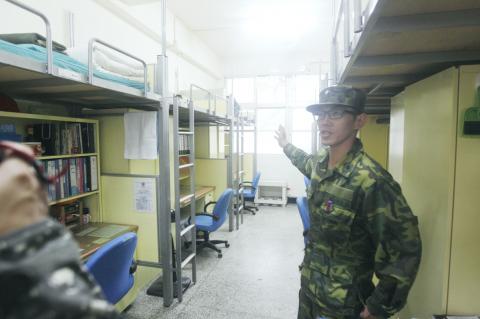The army on Monday introduced new initiatives at its military facilities that allow soldiers to use smartphones, browse the Internet in their free time and enjoy improved accommodation, in a bid to boost lower-than-expected enlistment figures.
During a media tour at a base in Pingtung County, the army showed off new soldiers’ quarters, which include air conditioning and desks for individual soldiers. In the past, soldiers had only beds and lockers.
The 333rd Brigade at the base in Pingtung is among 35 military units that have been chosen by the army to improve soldiers’ quality of life through the inclusion of certain creature comforts.

Photo: CNA
Staff Sergeant Lu Shu-hao (呂書豪) said the barracks had improved drastically on the quarters he had lived in previously.
“It’s like 500 times cooler than before,” he said.
Lu belongs to an experimental company made up entirely of enlisted soldiers in the army’s 333rd Brigade.

Photo: CNA
Meeting reporters on a base tour, Lu cited improvements in comfort, atmosphere and hygiene, which he said make the barracks “no longer look like a cheap hotel.”
To increase the appeal of being part of an all-volunteer force, a goal set for 2017, the military has taken steps to improve the living conditions of service members, in addition to paying higher salaries.
Taking shower facilities as an example, Lu said soldiers in his company can now use separate cubicles instead of the open bath commonly seen in army barracks. To be able to relax is very important after a day of drills and exercising, he added.
Other improvements include individual bunks, desks and closets, and perhaps more important for modern young people: The right to use smartphones.
In order to join the army, Lu gave up his US citizenship, saying it was the most important and the best decision he has made in his life so far.
Private Cheng Kai-yang also gave a thumbs-up for the improvements at the base, particularly new initiatives that include allowing military personnel to live off-base and eat outside on work days.
Being able to use smartphones at the base also allows them to stay connected with the rest of the world, Cheng said.
“I believe this will attract more young people to enlist,” he added.
According to the army, 80 percent of the military personnel at the selected 35 units have expressed satisfaction with the improved daily facilities and new measures.
The army began implementing the initiatives in October last year and over the past three months, 10 percent of the young men who are required to undergo four months of military training as part of the military’s plan to shift to an all-volunteer force agreed to enlist.
The army said it is planning to implement the new initiatives at more of its military units. In the 35 units, those who have volunteered to sign up for longer military service increased from 45.3 percent to 56.1 percent, according to the military.
The transition to an all-volunteer army was originally planned for next year, but the army pushed the date back due to lower-than-expected recruitment figures.

ANOTHER EMERGES: The CWA yesterday said this year’s fourth storm of the typhoon season had formed in the South China Sea, but was not expected to affect Taiwan Tropical Storm Gaemi has intensified slightly as it heads toward Taiwan, where it is expected to affect the country in the coming days, the Central Weather Administration (CWA) said yesterday. As of 8am yesterday, the 120km-radius storm was 800km southeast of Oluanpi (鵝鑾鼻), Taiwan’s southernmost tip, moving at 9kph northwest, the agency said. A sea warning for Gaemi could be issued tonight at the earliest, it said, adding that the storm is projected to be closest to Taiwan on Wednesday or Thursday. Gaemi’s potential effect on Taiwan remains unclear, as that would depend on its direction, radius and intensity, forecasters said. Former Weather Forecast

As COVID-19 cases in Japan have been increasing for 10 consecutive weeks, people should get vaccinated before visiting the nation, the Centers for Disease Control (CDC) said. The centers reported 773 hospitalizations and 124 deaths related to COVID-19 in Taiwan last week. CDC Epidemic Intelligence Center Director Guo Hung-wei (郭宏偉) on Tuesday said the number of weekly COVID-19 cases reported in Japan has been increasing since mid-May and surpassed 55,000 cases from July 8 to July 14. The average number of COVID-19 patients at Japan’s healthcare facilities that week was also 1.39 times that of the week before and KP.3 is the dominant

The Chinese Communist Party’s (CCP) working group for Taiwan-related policies is likely to be upgraded to a committee-level body, a report commissioned by the Mainland Affairs Council (MAC) said. As Chinese President Xi Jinping (習近平) is increasingly likely to upgrade the CCP’s Central Leading Group for Taiwan Affairs, Taiwanese authorities should prepare by researching Xi and the CCP, the report said. At the third plenary session of the 20th Central Committee of the CCP, which ended on Thursday last week, the party set a target of 2029 for the completion of some tasks, meaning that Xi is likely preparing to

US-CHINA TRADE DISPUTE: Despite Beijing’s offer of preferential treatment, the lure of China has dimmed as Taiwanese and international investors move out Japan and the US have become the favored destinations for Taiwanese graduates as China’s attraction has waned over the years, the Ministry of Labor said. According to the ministry’s latest income and employment advisory published this month, 3,215 Taiwanese university graduates from the class of 2020 went to Japan, surpassing for the first time the 2,881 graduates who went to China. A total of 2,300 graduates from the class of 2021 went to the US, compared with the 2,262 who went to China, the document showed. The trend continued for the class of 2023, of whom 1,460 went to Japan, 1,334 went to